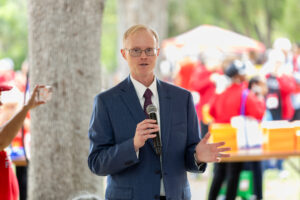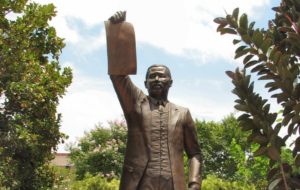Modifications May Impact Current Active School Employees and Employers
The Texas Senate State Affairs Committee and House Pensions Committee both laid out bills for public hearing today that make numerous changes to the Teacher Retirement System of Texas (TRS). While the bills discussed future retirement benefits for active employees, they did so as a way to protect the existing defined benefit plan for many years to come.
TRTA testified neutrally on these changes, while supporting the general concepts of improving TRS funding, making the pension fund actuarially sound, and providing a real cost-of-living increase for TRS retirees.
There are a number of details about these bills that TRTA members, and those who will retire under TRS in the future, need to know.
It is TRTA’s objective, for now, to remain neutral in our advocacy efforts on behalf of these bills and present factual representations of what the bills do as they are written.
This means there is still plenty of time for these bills to be revised. Much more information is needed about the actual fiscal impact these provisions will have on the TRS pension fund.
It is important to note that in both the Senate State Affairs Committee and House Pensions Committee, TRTA testified about our association’s strong belief that retired and active interests must be aligned as closely as possible to ensure stakeholder buy-in to any potential bill. We believe it is in every TRS member’s best interest to develop joint solutions to these issues and find ways to protect the retirement system in the long run. TRTA has strong organizational relationships with all of the active school employee, administrator, school board, and other education interest groups. By working with our friends in the Legislature and these other groups, we are much more likely to develop cohesive long-term strategies for protecting TRS.
Legislation:
SB 1458 by Senator Robert Duncan (Lubbock)—Chairman, Senate State Affairs Committee
HB 1884 by Representative Bill Callegari (Katy)—Chairman, House Pensions Committee
Legislative Provisions (bills currently are identical in what they are working to achieve):
Pension Contribution Rate
- State Rate is set in Legislative Appropriation Bill; however, there is ongoing discussion that the State may provide additional revenue to increase its contribution rate that is higher than either the current Senate or House proposal.
- These bills are now subject to legislative Conference Committee action, as both the Senate and House have adopted their versions of the state appropriations bill and the next step is conference committee work.
- Member Contribution rate in this bill would be equal to the state contribution, not to exceed 6.9%.
- Independent School District Rate—This legislation creates a new revenue stream for the TRS pension benefit by requiring school districts whose employees are not covered by Social Security (about 95% of all school districts) to make a 1% contribution to the TRS fund based on a school district’s minimum salary scale wages.
- This bill does not change the school district’s full contribution based on employees’ salaries above minimum salary scale (this has been in place for a number of years).
Benefit Structure
- The benefit changes listed in the bill have a grandfather provision that covers an estimated 50% of all school district employees.
- The grandfather provision protects anyone who meets the following criteria:
- As of August 31, 2014 the member is 50 years old; or
- meets the Rule of 70 (combination of years of service and age equal 70 or more); or
- the active member has at least 25 years of service.
- If the member does not meet one of these grandfathering provisions, the active member would be subject to the new minimum age 62 retirement age.
- This new provision maintains the Rule of 80 for all school employees, but mandates a new minimum age 62 for full retirement.
- Under this legislation, anyone qualifying for the Rule of 80 but who is not minimum age 62 will take a 5% reduction in their annuity for every year difference between their age at retirement and 62 (for example, Rule of 80 with age 60 results in a 10% reduction in retirement benefit).
- AGAIN, this proposal has a grandfather provision that protects an estimated 50% of all existing school district employees. There would be no immediate impact on school employees who are close to retirement and have met the qualifiers listed above.
- The bill modifies guaranteed interest earned on contributions made to TRS by members who terminate their participation in TRS and withdraw their contributions before retirement. Currently, the guaranteed rate of return is 5%. The legislation changes this rate of return to 2%. This is only for contributions withdrawn from TRS due to an employee’s choice to leave the teaching profession and take their contributions out of TRS.
Cost-of-Living Increase
- Authorizes a 3% cost-of-living increase for those who have been retired for 20 years or more.
- COLA is only authorized when the system is sound and cannot extend the system’s unfunded liability beyond 31 years.
- The monthly COLA provides a cap that limits annuity increase to $100/month.
TRS-Care
- Requires a retiree to meet the Rule of 80 with minimum age 62 in order to participate in TRS-Care II or III.
- This provision carries some of the same grandfather as mentioned above, excluding the age 50 provision . The grandfather provision protects anyone who meets the following criteria:
- meets the Rule of 70 (combination of years of service and age equal 70 or more); or
-
- the active member has at least 25 years of service.
- In addition, existing TRS-Care participants are not affected by this change.
TRTA members and every interested person in these two bills need to know that:
- Nothing has been yet decided or voted upon;
- There are no guarantees that any of these changes will provide a COLA to any TRS retiree at this time;
- Resistance to these possible changes is likely;
- TRTA is working closely with our friends in the Legislature and with the active school employee and employer community;
- No TRS retiree has had a real cost-of-living increase in over 12 years;
- The legislation attempts to make the system actuarially sound and discusses a path to a raise for a group of more senior TRS retirees;
- The proposal suggests a 3% increase for retirees who retired August 31, 1994 and before;
- According to TRS testimony, IFthis raise were to occur it would impact about 60,000 TRS retirees (out of 330,000 current annuitants);
- TRTA is neutral on these concepts until more is known about actuarial impact, active school employee and employer buy-in, and the long-term funding decisions made by the Texas Legislature.
With legislative session already more than half over, there is a great deal of work and discussion that must be done before any final decisions can be made.
TRTA testimony has stressed stakeholder group partnership in these discussions. We are grateful to be talking about making the system actuarially sound this session and providing a path to a pension increase for TRS retirees.
As we have communicated to both Chairman Duncan and Chairman Callegari, it is our belief that this benefit increase should be far more inclusive and benefit more TRS retirees. We understand and appreciate the desire to help the more senior and more needy TRS retirees first, but more can and should be done to reach higher goals.
The first thing that should be considered is increasing the state contribution to a much higher level. TRTA recommends a state contribution level of 6.9% in FY 2014 and 7.4% in FY 2015.
Now that these bills have been heard in committee, a fiscal impact statement will be determined. TRTA will keep you informed about when this information is made available. We will also continue to work through this process in the best interest of our TRTA members and in close partnership with legislators and our friends in the active educator community.
We also want to hear from you. Please let us know how you feel about these discussions!
Rest assured, TRTA will keep you informed every step of the way as these bills are discussed, reviewed, negotiated, and acted upon.
We appreciate your support and membership in the Texas Retired Teachers Association. If you are not a member and want to join, please contact our office at 1.800.880.1650 for more information. TRTA membership costs $25 per year.
Special note: TRTA is hosting its 60th annual convention in Corpus Christi this week. Staff will return phone calls during the week as our duties permit. The office is open to serve you, but response time on issues may be longer than normal due to the commitment we have with our convention. Thank you!



